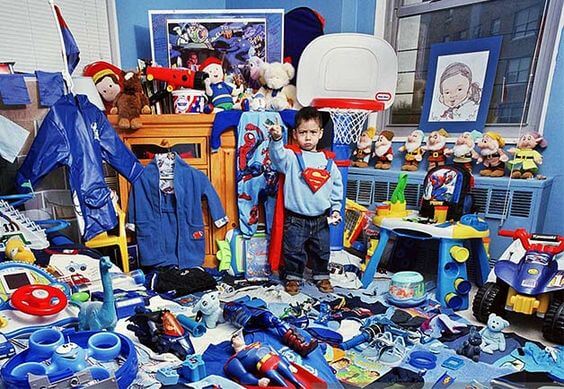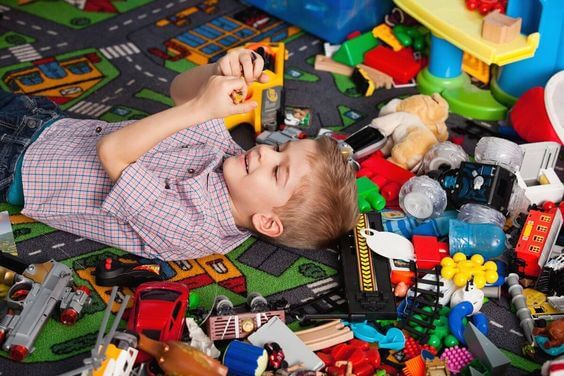7 Reasons To Not Give Your Child Too Many Toys

Few issues are as delicate as those that challenge the way we raise our children. The gifts that we give them are almost always a motive for criticism. Nowadays many parents compensate for their deficiencies by giving too many toys or gifts. We often believe that presents can replace the time we don’t spend with our children.
However, the main reason for buying them toys is that we are crazy about them. We buy them gifts because we love them and enjoy the act. We rarely accept criticisms for doing so.
We may think they deserve everything they want and if I can afford it, well that’s my business. However, research has revealed that this mindset isn’t always correct. Let’s take a look at the findings.
Is it wrong to give children too many toys?
It is justified for parents to want to see their children happy. As you can imagine, the moment children receive a gift is a great joy for them. Even though it doesn’t last long, to see them so happy brings joy to us as well. That’s why we do it.
But tesearchers have recently found that there is risk in giving away too much to our children. They have even termed a condition “too many toys syndrome.” They say the main problem is related more to the type of gift a child receives, not just the fact of receiving one.
What happens if we give them toys?

It isn’t bad to give children toys, especially when these can excite their imagination. Toys can also be didactic and entertaining. However, problems emerge when we start to give them an exaggerated amount of toys. Some children truly have too many toys. In order to avoid this, limits should be placed by parents.
Children can get accustomed to receiving toys. Usually, they receive them without putting in any effort. This prevents them from valuing gifts in the right way.
It is not the same to receive a well-deserved gift than to just receive “another one.” Children can end up not being aware of the true importance of receiving a gift.
Here are a few reasons not to give away too many toys:
- Their imagination becomes limited. This happens because they only play the way the toys indicate. This causes the child to stop creating things with their minds.
- They will only have fun playing with toys
- Little by little they lose enthusiasm for certain toys because they have too many
- Most of their gifts will be forgotten because they will always have their favorites
- You will have more work when it comes to cleaning up their rooms
- In some cases, the child becomes selfish. This attitude usually continues until adulthood.
- The child becomes prone to frustration. In the real world you cannot have everything you want. This problem can also present itself when they reach adulthood.
Other gift options

As we previously stated, toys are important for a child’s development. However, we prefer certain toys over others. Experts recommend that we avoid giving toys with too many lights, sounds or functions. These toys take away from creativity. There are others options that can make for great gifts. The following are just a few.
- Taking trips and walks. Make your children put in some effort to earn a ride or a trip. There are no memories more beautiful than those of family trips. Children often appreciate these moments.
- Books are irreplaceable. Helping them developing a habit of reading from childhood is one of the best gifts you can give a person. Give them a book, teach them to enjoy the art of reading.
- Family moments. Most family activities are enjoyable when agreed upon. Ask them what they would like to do. Ask them if they would like a trip to the zoo or the beach. Give them the opportunity to discover places that they can be passionate about.
- From time to time, indulge in some tasty ice-cream or a cocktail of healthy fruits and sweets.
All cited sources were thoroughly reviewed by our team to ensure their quality, reliability, currency, and validity. The bibliography of this article was considered reliable and of academic or scientific accuracy.
- Instituto de consumo de Extremadura. Un juguete para cada edad. Extraído de: https://saludextremadura.ses.es/filescms/incoex/uploaded_files/CustomContentResources/UN_JUGUETE_PARA_CADA_EDAD.pdf
- AIJU. (2019). Juego y juguete 2019/2020 – Guía AIJU. AIJU, Instituto Tecnológico de Producto Infantil y Ocio. https://guiaaiju.com/guias/Guia-AIJU-2019-20.pdf
This text is provided for informational purposes only and does not replace consultation with a professional. If in doubt, consult your specialist.
